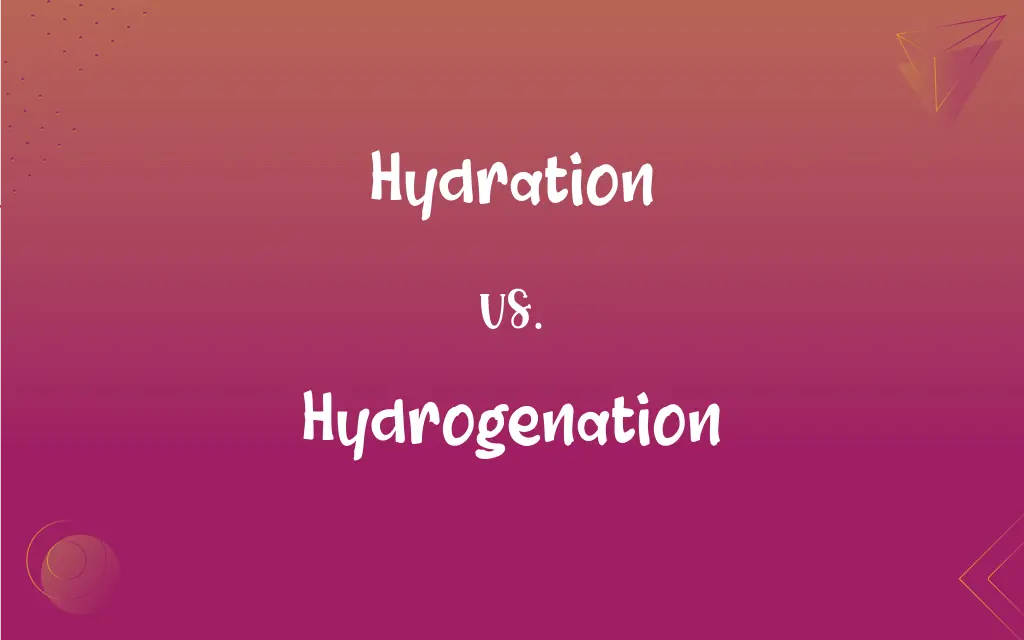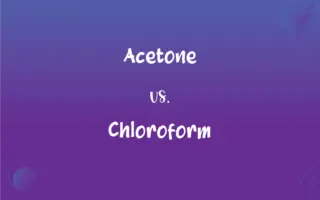Hydration vs. Hydrogenation: What's the Difference?
By Janet White || Published on December 22, 2023
Hydration involves adding water or its elements to a substance, whereas hydrogenation involves adding hydrogen to a compound.

Key Differences
Hydration is a chemical process where water is added to a compound, often changing its properties, such as making it more soluble. Hydrogenation, on the other hand, is a chemical reaction where hydrogen is added to another compound, typically to reduce or saturate organic compounds.
In hydration, the focus is on the interaction between water molecules and other substances, crucial in biological and chemical processes. Hydrogenation is primarily used in industrial processes, such as converting unsaturated fats to saturated fats in food production.
The process of hydration is essential in many natural phenomena and industrial processes, impacting things like cement curing and bodily functions. Hydrogenation, conversely, is a critical process in the food industry and organic chemistry, influencing the texture and stability of products.
Hydration can be a spontaneous process in nature or controlled in a laboratory setting, affecting the physical and chemical properties of substances. Hydrogenation typically requires a catalyst and is employed to alter chemical bonds within a compound, significantly impacting its chemical structure.
The outcomes of hydration are varied, ranging from hydration of ions in solution to hydration of gases. Hydrogenation often results in the hardening of oils, producing substances like margarine from plant oils.
ADVERTISEMENT
Comparison Chart
Definition
Addition of water or its elements
Addition of hydrogen atoms
Use in Industries
Used in construction, biology, chemistry
Used in food, chemical industries
Chemical Process
Involves H2O molecules
Involves H2 molecules
Effect on Compounds
Changes solubility, reactivity
Changes saturation, stability
Common Example
Curing of cement
Hardening of vegetable oils
ADVERTISEMENT
Hydration and Hydrogenation Definitions
Hydration
In chemistry, hydration is the addition of water to a substance.
The hydration of anhydrous copper sulfate results in a color change from white to blue.
Hydrogenation
Hydrogenation is the chemical reaction of adding hydrogen to another substance.
The hydrogenation of vegetable oil produces margarine.
Hydration
In biology, hydration is the uptake of water by cells or tissues.
The hydration of skin cells is vital for maintaining healthy, supple skin.
Hydrogenation
In organic chemistry, hydrogenation refers to saturating organic compounds by adding hydrogen.
The hydrogenation of ethene yields ethane.
Hydration
Hydration is the process of absorbing water.
Plants undergo hydration when watered, absorbing moisture through their roots.
Hydrogenation
Hydrogenation can alter the physical properties of substances.
The hydrogenation process changes liquid oils into solid fats.
Hydration
Hydration refers to the state of being adequately hydrated or having sufficient water.
Proper hydration is crucial for athletes to maintain peak performance.
Hydrogenation
Hydrogenation is used to convert unsaturated fats to saturated fats.
The food industry uses hydrogenation to extend the shelf life of products.
Hydration
Hydration can also mean the process of combining a compound with water.
The hydration reaction in cement is essential for its setting and hardening.
Hydrogenation
It involves the use of a catalyst to add hydrogen to molecules.
The hydrogenation of nitrobenzene involves a catalyst to produce aniline.
Hydration
A solid compound containing water molecules combined in a definite ratio as an integral part of the crystal. Often used in combination
Pentahydrate.
Hydrogenation
(chemistry) The chemical reaction of hydrogen with another substance, especially with an unsaturated organic compound, and usually under the influence of temperature, pressure and catalysts.
Hydration
To rehydrate.
Hydrogenation
The act of combining with hydrogen, or the state of being so combined.
Hydration
To supply water to (a person, for example) in order to restore or maintain fluid balance
"Cold water is the fastest and safest way to hydrate an ordinary athlete" (Jane E. Brody).
Hydrogenation
A chemical process that adds hydrogen atoms to an unsaturated oil;
Food producers use hydrogenation to keep fat from becoming rancid
Hydration
To become a hydrate.
Hydration
(chemistry) The incorporation of water molecules into a complex with those of another compound.
Hydration
(biology) The process of providing an adequate amount of water to body tissues.
Hydration
(construction) The chemical reaction by which a substance (such as cement) combines with water, giving off heat to form a crystalline structure in its setting and hardening.
Hydration
The act of becoming, or state of being, a hydrate.
Hydration
The process of combining with water; usually reversible
FAQs
What is the purpose of hydrogenation in food?
In food, hydrogenation is used to convert unsaturated fats to saturated, altering texture and stability.
Is hydration important for the human body?
Yes, hydration is crucial for maintaining bodily functions and overall health.
How does hydration affect physical properties?
Hydration can change a substance's solubility, reactivity, and physical state.
What is hydrogenation?
Hydrogenation is the chemical process of adding hydrogen to a compound.
What is hydration?
Hydration is the process of adding water to a substance or the state of being adequately hydrated.
How does hydrogenation affect organic compounds?
Hydrogenation saturates organic compounds, altering their chemical structure and stability.
Is hydrogenation reversible?
Hydrogenation is generally not reversible under normal conditions.
Can hydration occur in gases?
Yes, gases can undergo hydration under certain conditions.
What is an example of hydration in nature?
Plant absorption of water from the soil is a natural example of hydration.
Does hydrogenation require a catalyst?
Yes, hydrogenation typically requires a catalyst to proceed.
What is the difference between hydration and dehydration?
Hydration is the process of adding water, while dehydration is the removal of water.
Can hydration affect a substance's color?
Yes, hydration can change a substance's color, like in hydrated copper sulfate.
What role does hydration play in skincare?
Hydration is vital for maintaining skin moisture, elasticity, and overall health.
What foods undergo hydrogenation?
Many processed foods, like margarine and shortening, undergo hydrogenation.
Why is hydrogenation important in the chemical industry?
Hydrogenation is used to modify the chemical properties of compounds, crucial in manufacturing various chemicals.
What are the health implications of hydrogenated foods?
Hydrogenated foods can contain trans fats, which are associated with health risks.
Can hydrogenation occur naturally?
Hydrogenation is primarily an industrial process and rarely occurs naturally.
How does hydration impact athletic performance?
Adequate hydration is essential for optimal physical performance and endurance in athletes.
Are all oils capable of being hydrogenated?
Most unsaturated oils can be hydrogenated, but the extent and ease depend on their chemical structure.
How is hydration used in construction?
Hydration is key in cement curing, where water reacts with cement to harden it.
About Author
Written by
Janet WhiteJanet White has been an esteemed writer and blogger for Difference Wiki. Holding a Master's degree in Science and Medical Journalism from the prestigious Boston University, she has consistently demonstrated her expertise and passion for her field. When she's not immersed in her work, Janet relishes her time exercising, delving into a good book, and cherishing moments with friends and family.






































































